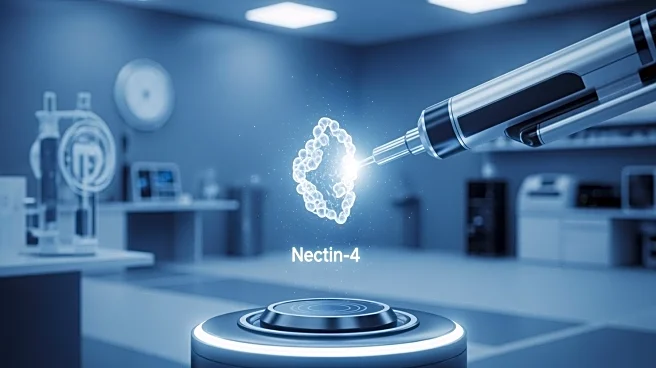What's Happening?
Marengo Therapeutics, a clinical-stage biotechnology company, announced the presentation of preclinical data on its TriSTAR0701 program at the Society for Immunotherapy of Cancer (SITC) 2025 Annual Meeting.
The program targets Nectin-4, a tumor antigen overexpressed in various solid tumors. The TriSTAR platform is designed to harness the diversity of the T cell repertoire, redirecting unique T cell subsets against tumor targets. The company is collaborating with the National Cancer Institute to explore combination strategies with standard-of-care agents, aiming to expand antitumor immune activation.
Why It's Important?
The introduction of the TriSTAR platform represents a significant advancement in precision immunotherapy, offering potential improvements in cancer treatment outcomes. By targeting Nectin-4, Marengo Therapeutics aims to address tumors that are resistant to traditional therapies. The collaboration with the National Cancer Institute highlights the importance of combining innovative therapies with existing treatments to enhance efficacy and broaden patient access. This development could lead to more effective and durable cancer treatments, benefiting patients with hard-to-treat tumors.
What's Next?
Marengo Therapeutics plans to continue its collaboration with Ipsen and the National Cancer Institute to advance its immune therapies. The company will present additional preclinical data at the SITC Annual Meeting, focusing on combination strategies with immune checkpoint inhibitors and other agents. These efforts aim to validate the therapeutic potential of the TriSTAR platform and expand its application across multiple tumor types. The ongoing research and presentations will provide insights into the platform's effectiveness and guide future clinical trials.
Beyond the Headlines
The TriSTAR platform's ability to selectively engage T cell subsets offers a novel approach to overcoming T cell exhaustion in 'cold' tumors. This innovation could lead to a paradigm shift in cancer treatment, emphasizing the importance of personalized immunotherapy. The platform's dual-payload design enhances the therapeutic index, potentially reducing side effects and improving patient outcomes. As research progresses, the platform may pave the way for new treatment modalities that leverage the body's immune system to combat cancer more effectively.









